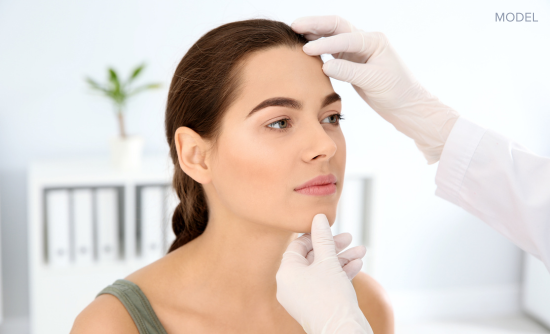Regular full-body skin cancer screening plays a vital role in detecting skin cancer early when it’s most treatable. But what exactly does a skin cancer screening entail? How often should you get screened? And at what age should you start? In this blog post, we answer some of the most common questions patients ask their dermatologists about skin cancer screenings. We hope our answers help you understand the importance of screening and what to expect.
1. What Is a Skin Cancer Screening?
A skin cancer screening is a visual examination of your skin by a dermatologist. During the screening, the dermatology provider will inspect your skin, looking for any suspicious moles, growths, or lesions that are pre-cancerous or could indicate cancer. It’s a noninvasive procedure and doesn’t require any special preparation.
2. Why Is Full-Body Skin Cancer Screening Important?
Skin cancer is the most common form of cancer, but it’s highly treatable when detected early. Regular screenings allow for early skin cancer detection, increasing the chances of successful treatment and reducing the risk of complications.
3. At What Age Should You Get a Skin Cancer Screening?
It’s recommended to start getting regular skin cancer screenings in your early 20s, especially if you have risk factors such as a family history of skin cancer, a personal history of skin cancer or a large number of moles, fair skin, or a significant amount of sun exposure. But because skin cancer can occur at any stage of life, people of any age can benefit from screening.
4. How Often Should I Be Screened?
The frequency of skin cancer screening depends on individual factors and risk levels. As a general guideline, annual screenings are recommended. However, more frequent screening may be necessary if you have a history of skin cancer or certain risk factors. Your dermatologist will provide personalized recommendations based on your specific situation.
5. How Do I Check My Skin at Home?
While professional skin cancer screenings are crucial, you can perform self-examinations at home to monitor your skin health between appointments. In a well-lit room, thoroughly examine your scalp, face, neck, ears, torso, limbs, and back, using a hand-held mirror for hard-to-see areas. During the examination, remember the ABCDE rule: check for asymmetry, irregular borders, color variations, diameters larger than 6 millimeters, and any evolving changes in existing moles or the appearance of new ones. Our website Skin Cancer section shows examples and provides further links for even more information. If you notice any concerning changes, schedule an appointment with your dermatologist for a professional evaluation.
6. How Much Does a Skin Cancer Screening Cost?
The cost of a skin cancer screening can vary depending on factors such as the location and the health care provider. In many cases, health insurance plans cover the cost of preventive screenings, including skin cancer screenings. It’s best to check with your insurance provider to understand your coverage. However, it’s important to remember that investing in regular screenings is an investment in your long-term health.
Request a Consultation
At The Clinic for Dermatology and Wellness, your well-being is our top priority. If you’d like to schedule a skin cancer screening, please call our office today at (541) 200-2777 or request a consultation. Our experienced dermatologists are here to provide you with expert care and peace of mind.

Leave a Reply